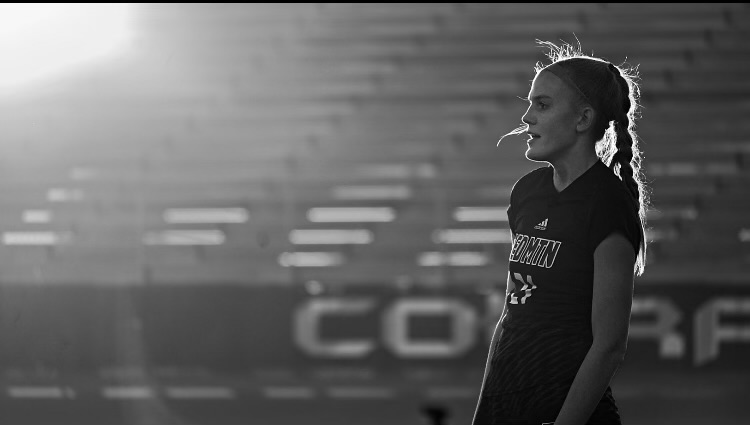A light in the darkness
December 1, 2022 by Logan Stanley, Arizona State University

Logan Stanley is an ASU Cronkite School of Journalism student assigned to cover Red Mountain High School for AZPreps365.com.
Throughout her life, Red Mountain senior Jaimie Rusnak dealt with issues most people don’t ever even consider. Nightmares became a reality for Rusnak.
Most kids are concerned with the latest show on Disney Channel, or whose house they will be sleeping over at that weekend.
Not having to deal with helping their older sister learn how to walk again. Or the thought of losing your mother.
There was the rare autoimmune disorder that her sister, Brittani, started to suffer from after developing the condition at 11 years old.
Then there was her mom, Linda, getting breast cancer when Jaimie was in the third grade.
All of this happened before Jaimie turned 9 years old.
Despite these challenges, she has maintained an upbeat attitude while putting together nearly a flawless record in school and athletics. She has donated over 500 hours toward charitable efforts, hand sewing blankets for cancer centers around the Valley.
Rusnak is also one of the top soccer players in the area. She will most likely play soccer at the collegiate level. She has cemented herself as a name to watch in the 6A region, one of the most competitive in all of Arizona.
She’s a 6-foot-forward who was voted the East Valley regional offensive player of the year after registering 19 goals and 17 assists in 23 games last season in her first year playing the sport at the high school level.
But the real story for Rusnak isn’t her athletic exploits. It’s off the field.
Role reversal: little sister helps big sister
Transverse myelitis is a relatively rare disorder that occurs most often in children ages 10 to 19 and adults 30 to 39. It is a neurological autoimmune condition that happens when both sides of the same section of the spinal cord become inflamed.
This inflammation can damage myelin, the fatty substance that covers your nerves. There are several symptoms, most notably paralysis. Some experience full or partial paralysis.
Brittani, when she was 11, began to suffer symptoms of transverse myelitis. Coming from an athletic family the news was shocking to Rusnak’s, who have three children five years apart (Brittani, 23, Joey, 21, Jaimie 18) that all played sports.
Transverse myelitis? What’s that?
For some with transverse myelitis, they just wake up one morning without the ability to walk. Or it can be more gradual, with pain in the legs building up to the point of paralysis. The latter was the case for Brittani.
Going from being an active child to suddenly being bed-ridden was not only difficult to deal with physically, but the mental strain was even greater on Brittani. With her immune system being severely compromised and confined to laying down, Brittani was unable to socialize.
That’s all she wanted to do at 11 – be with her friends. But she couldn’t. Loneliness was beginning to creep in.
There was Jaimie though, who was 6 years old at the time and refused to leave her sister’s side.
“She just sat there with me,” Brittani said. “It’s a very isolating illness. At the time, we would always watch Say Yes To The Dress and Cake Boss, those were our shows. For her to sit there as a six-year-old kid, you know she’s in kindergarten, no kindergartener wants to just sit there. But she just sat there with me.
“We didn’t even have to talk. But she brought company and comfort. It always like, ‘Oh, I’ll get you a blanket. Or I’ll get you this.’ She’s just always present. That was a great thing about her. It meant everything.”
Jaimie, who obviously didn’t understand the science but just knew her sister was sick, wanted to do whatever it was she could for Brittani.
She was there for physical therapy, helping guide Brittani and lending a hand as much as a kindergartner could at the time.
Eventually, with rigorous care and therapy, Brittani was able to gain her health and strength back over a few years. She ended up becoming one of the cases that didn’t suffer full or partial paralysis. There are times to this day Brittani still deals with lingering flare-ups of transverse myelitis, but she lives a full life and currently works as a nurse.
But right when Brittani started to get better from her health scare, the family received another round of devastating news.
'I need pink'
During Linda’s annual mammogram, doctors noticed a bump on her scans. This was startling to Linda, outside of the obvious, but also because there was not a trace of cancer in her family, and she lived a very healthy lifestyle.
Even when she went in for a follow-up visit, a friend of Linda’s, who is also a doctor, told her she was going to be just fine. There was no way she had breast cancer, the friend said.
Linda didn’t even bring her husband to the appointment because of how little she thought of it.
But as she sat in the room waiting for the doctor to come in, Linda began to get this eerie feeling. She’s going to tell me I have it, don’t I?
The first words out of the doctor’s mouth were, “Well…”
Linda knew immediately.
Jaimie's first thought?
“I need pink to wear,” Jaimie recalled saying after the news was broken.
In her 8-year-old mind, that was her way of showing support. All she knew was that pink was the color for breast cancer awareness.
Cancer can be a hard concept for a child to understand. Once her mother started chemotherapy, Jaimie began to see the effects on her mom.
With her fight with breast cancer coming right after Brittani was recovering from transverse myelitis, Linda knew she had to put on a display of strength for the children.
“What bothered her (Jaimie) was the loss of hair,” Linda said. “That was huge. I was coaching her soccer team at the time and was starting my treatments, and she wanted me to have hair to give out the awards at the end of the soccer season. I was holding on by a thread of hair.
“She wanted everyone to see me as ‘mom.’ So, I went with a baseball cap on, I didn’t take it off. You could still see that I had hair. Because in her eyes, I looked good. I was sicker than a dog, but I made it there. That’s what she needed to see.”
With chemo taking away most of the little energy Linda had left and her husband, Ron, having to balance work and caring for his ailing wife while trying to still be a dad, the Rusnak’s had family and friends step in.
Linda’s siblings, Mary and Ray, and her sister-in-law, Pam, came in when needed to bring the three kids to their classes or run errands. Teachers showed up in the crowd at sporting events to cheer. Neighbors dropped off dinners weekly.
With this kind of support system, this helped Jaimie get through the difficult times during her childhood. But she soon discovered another way to forget about it all: sports.
Using sports as an escape
Soccer was the first sport Jaimie remembers playing at around age 3.
“Honestly, I was a very angry child when this was going on because I didn’t know how to express my emotions very well,” Jaimie said. “Sports kind of gave me an outlet. Got my energy out. Sports are always there for you. If I was mad, I would go dribble a ball outside, or something. That’s how I used it to cope.”
She did a little bit of everything, like most kids do growing up. But eventually she decided not on one, not two, not three, but four sports that piqued her interest. Jaimie joined the swim team, following in the footsteps of her older brother Joey.
She also was a member of the beach volleyball and basketball teams at Red Mountain. Being one of the tallest girls in the school, those two sports were logical destinations.
But it is on the pitch where Rusnak has found the most success. This past season, her first at the varsity level, was productive.
Rusnak appeared in 19 matches, averaging 2.9 points per game. On the season, she contributed 55 points and helped lead the Mountain Lions to a 15-8 overall record and a first-place finish in the 6A East Valley. She was named to The Arizona Republic’s All-Arizona Honorable Mention State Team. Rusnak also made the 6A All-Conference First Team.
While sports became a way for Rusnak to just focus on the task at hand, a gift from her aunt, Mary, led her down a path that she is still on today.
Yarn and a sewing machine: a story of compassion
With so many nights spent in the hospital, Brittani knew very well just how uncomfortable hospital gowns could be.
Brittani started Pajamas for Patients, a program that donated pajamas to children’s hospitals. Brittani would raise money, go to a store to buy some and bring pajamas to patients at the hospital.
This planted a seed in Jaimie’s mind.
The idea would be nurtured eventually into Jaimie starting a charity program of her own.
When she was 12, Jaimie received a white and teal Janome sewing machine as a present from her aunt, Mary, as well as sewing lessons.
Over the course of six years, Jaimie has hand-sewn and donated more than 300 blankets to local hospitals around the Valley. Jaimie said she has spent more than 500 hours on all of it.
“I wasn’t surprised,” Red Mountain strength and conditioning coach Breanna Peterson, who trains Jaimie, said. “I was like, ‘of course you did. What else can’t you do?’ That’s her character. That’s just who she is.”
When Rusnak found out that the Navajo Nation needed masks during the COVID-19 pandemic, she did what she always does: give back.
Rusnak found a quick tutorial on YouTube on how to make a mask, spent about a day mastering the craft, and then put together 200 to donate.
“As a parent, you’re so proud,” Linda said. “You’re happy she didn’t let anything affect her. That is the best part, she’s still a great person. She didn’t take the cards that were dealt to us and be a jerk, or cause problems in school.
“She definitely could have, rightfully so. But she didn’t. And even that she realized, in her own little mind, how can I do something? It worked out that her giving back was also her therapy. We’re happy as we could be. She’s gone through so much. She deserves what’s coming her way.”
After receiving so much support growing up, Jaimie could only really think of one way to show gratitude.
She thought about each person and each family that made time for hers during a time of need.
“I was always the one getting help,” Jaimie said. “I was the charity that people would give to. I knew I wanted to give back because they gave me the good memories — cancer’s not good at all, it comes with so many bad memories. But what I really remember are those small little acts of kindness that people gave me. I want to give back to my community that helped me through everything, to the nurses that saved my mom and sister's lives. That’s what motivates me."
